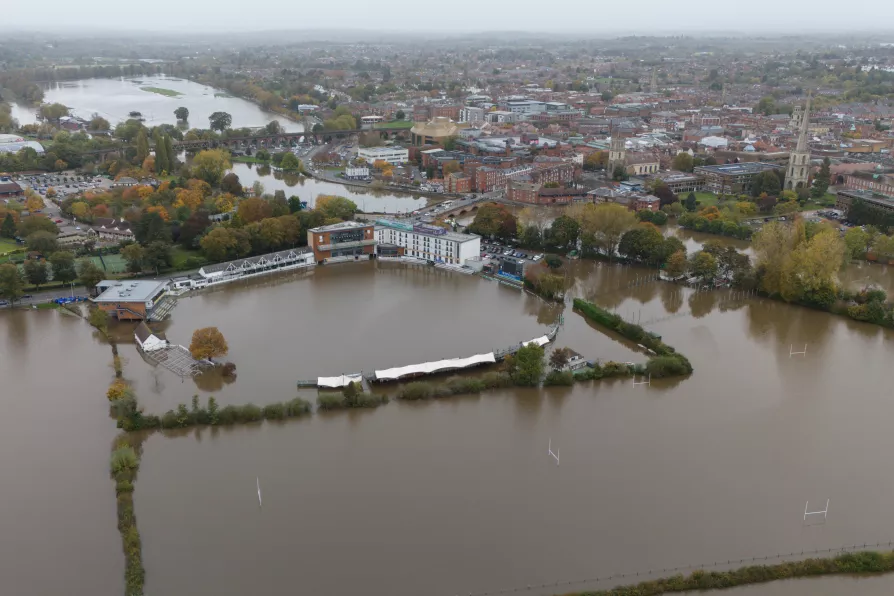
 An aerial view showing a flooded New Road Cricket ground in Worcester, home of Worcestershire CCC. Flood warnings remained in place across the UK on Monday after Storm Ashley made its presence felt, October 21, 2024
An aerial view showing a flooded New Road Cricket ground in Worcester, home of Worcestershire CCC. Flood warnings remained in place across the UK on Monday after Storm Ashley made its presence felt, October 21, 2024
THE “climate emergency” is not in the future. It is now, and each severe weather event exposes the fragility of systems we rely on on a daily basis.
Serious floods in western England caused by Storm Ashley are no anomaly: every year sees more such incidents. The State of the UK Climate report shows that Britain is getting wetter as well as hotter: five of the 10 wettest years on record have been in the 21st century, and rainfall over the last decade is 9 per cent higher than in the 1960s.
The consequences of such changes cannot be ignored indefinitely. England suffered its second-worst harvest on record this year, with the wheat crop down by more than a fifth, winter barley (primarily important for animal feed, but also for brewing) by more than a quarter and rapeseed (used for animal feed, cooking oil and many processed foods) by almost a third.
Britain imports about half its food: but then, climate change is a global phenomenon. France’s wheat harvest this year is nearly a fifth lower than usual. Drought has played havoc with olive oil harvests in Greece and Spain.
Britain is an outlier in that crisis-ridden agriculture has not yet prompted tractor columns descending on the capital.
The politics of the farmers’ protests of Brussels, Paris or Berlin has been mixed, with measures designed to slow or mitigate climate change often the focus of farmers’ anger — as they were early this year in Wales, prompting a row with outgoing first minister Mark Drakeford.
Since politicians are unwilling to challenge the power of giant agribusiness or major retailers, whose profiteering squeezes the incomes of individual producers, the responses are usually reactionary too: as with EU Commission chief Ursula von der Leyen’s decision to scrap plans to halve pesticide use across the bloc, despite irrefutable evidence of a sharp decline in insect populations that could have devastating longer-term consequences for food production.
The protests should remind us, though, that our lives depend on systems which are currently breaking down. Despite a couple of blips during the pandemic, we are not used in Britain to actual scarcity of produce, and it might seem an odd concern when Britain still throws away nearly 10 million tonnes of food a year.
Yet internationally collapsing crop yields will create scarcity. Very few governments plan with this in mind: the most obvious is China, which maintains over 700 million tonnes of stockpiled grain, enough to feed its population for more than a year in the event of sudden agricultural shocks. Norway, too, is beginning to invest in serious grain reserves. But these are not part of the policy toolkit of most Western governments.
Instead scarcity will play out through pricing, as the handful of giant companies which dominate global agribusiness exploit it to hike up profits — as they did in the inflationary crisis of 2022-23. Our fundamentally anti-social distribution model keeps the profits flowing for the likes of Tesco and Unilever while both the consumer and producer pay the price. This is increasingly unsustainable.
A serious government would be addressing the impact of climate change through mitigation. It would be ready to spend money on flood defences, to protect cities and to protect agriculture. It would not leave vital systems like water in the hands of a private sector that continues to pay its executives millions in bonuses even while paying millions in fines for polluting and poisoning our rivers.
It would, in short, be treating climate change as an emergency: a process which requires us to rethink the way we live from city planning to transport to food production.
The continued failure of politicians to acknowledge that is a case of system failure.
Capitalism cannot sacrifice short-term profit even facing a crisis of this scale. But that puts the responsibility on us to demand better.

From summit to summit, imperialist companies and governments cut, delay or water down their commitments, warn the Communist Parties of Britain, France, Portugal and Spain and the Workers Party of Belgium in a joint statement on Cop30

The West’s dangerous pesticide dumping in Africa is threatening biodiversity, population health and food sovereignty, argues ROGER McKENZIE

Olive oil remains a vital foundation of food, agriculture and society, storing power in the bonds of solidarity. Though Palestinians are under attack, they continue to press forward write ROX MIDDLETON, LIAM SHAW and MIRIAM GAUNTLETT











